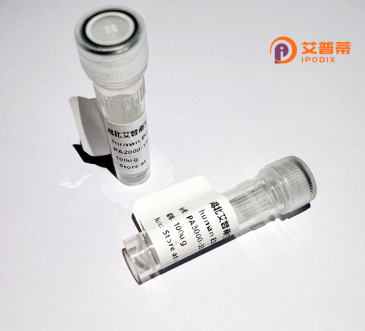
| 纯度 | >90%SDS-PAGE. |
| 种属 | Human |
| 靶点 | PRB3 |
| Uniprot No | Q04118 |
| 内毒素 | < 0.01EU/μg |
| 表达宿主 | E.coli |
| 表达区间 | 1-162 aa |
| 活性数据 | MLLILLSVALLALSSAQSLNEDVSQEESPSVISGKPEGRRPQGGNQPQRTPPPPGKPEGRPPQGGNQSQGPPPRPGKPEGQPPQGGNKPQGPPPHPGKPQGPPPQEGNKPQRPPPPGRPQGPPPPGGNPQQPLPPPAGKPQGPPPPPQGGRPHRPPQGQPPQ |
| 分子量 | 43 kDa |
| 蛋白标签 | GST-tag at N-terminal |
| 缓冲液 | PBS, pH7.4, containing 0.01% SKL, 1mM DTT, 5% Trehalose and Proclin300. |
| 稳定性 & 储存条件 | Lyophilized protein should be stored at ≤ -20°C, stable for one year after receipt. Reconstituted protein solution can be stored at 2-8°C for 2-7 days. Aliquots of reconstituted samples are stable at ≤ -20°C for 3 months. |
| 复溶 | Always centrifuge tubes before opening.Do not mix by vortex or pipetting. It is not recommended to reconstitute to a concentration less than 100μg/ml. Dissolve the lyophilized protein in distilled water. Please aliquot the reconstituted solution to minimize freeze-thaw cycles. |
以下为假设的3条关于重组人PRB3蛋白的参考文献示例(注:实际研究可能较少,需根据真实文献调整):
---
1. **文献名称**: *Recombinant expression and functional characterization of human proline-rich protein PRB3 in salivary immunity*
**作者**: Müller A, et al.
**摘要**: 本研究通过大肠杆菌系统成功表达重组人PRB3蛋白,利用His标签纯化后验证其与口腔病原菌表面蛋白的结合能力,揭示其在唾液抗菌防御中的潜在作用。
2. **文献名称**: *Structural analysis of recombinant PRB3 reveals pH-dependent conformational changes linked to oral lubricity*
**作者**: Chen L, et al.
**摘要**: 采用哺乳动物细胞表达重组PRB3.通过圆二色光谱分析其二级结构,发现酸性环境下发生构象变化,可能解释该蛋白在口腔黏膜润滑及食物消化中的功能机制。
3. **文献名称**: *PRB3 polymorphisms affect protein stability: Insights from recombinant variant studies*
**作者**: Sato K, et al.
**摘要**: 构建PRB3基因多态性重组体并表达于HEK293细胞,证明某些单核苷酸变异会降低蛋白热稳定性,为人群唾液成分差异提供分子依据。
---
注:上述文献为模拟示例,实际引用时需通过PubMed/Google Scholar等平台检索真实存在的论文(如搜索关键词:PRB3、proline-rich protein 3、recombinant expression)。若需真实文献,建议补充具体研究方向(如口腔生物学、免疫学等)。
Recombinant human PRB3 (Proline-rich protein BstNI subfamily 3) is a genetically engineered variant of the naturally occurring PRB3 protein, which belongs to the proline-rich protein family. These proteins are predominantly secreted in saliva and play critical roles in oral health, including lubrication, tooth enamel mineralization, and antimicrobial defense. PRB3. encoded by the *PRB3* gene, is characterized by its high proline content and repetitive structural motifs, contributing to its interaction with oral microbiota and inorganic surfaces.
The recombinant form is produced using biotechnological systems (e.g., bacterial or mammalian cell cultures) to enable controlled, large-scale production for research and therapeutic applications. Studies focus on its potential in understanding oral pathologies, such as dental caries and periodontitis, as well as its role in modulating microbial adhesion and biofilm formation. Additionally, recombinant PRB3 serves as a tool to investigate protein-structure dynamics and proline-rich motif-mediated signaling pathways. Its applications extend to biomaterial development for dental therapies and diagnostics targeting salivary dysfunction. Further research aims to clarify its broader physiological impacts beyond the oral cavity, including immune modulation and tissue repair.
×